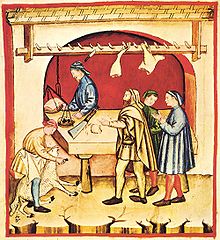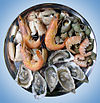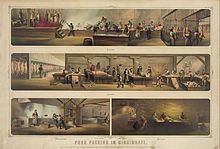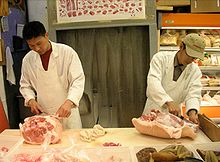- Butcher
-
"Boning" redirects here. For the use of this term in corsetry, see Bone (corsetry).For other uses, see Butcher (disambiguation).
Butcher 
A butcher's, Tacuinum sanitatis casanatensis (XIV (14th) century)Occupation Activity sectors Manufacturing Description A butcher is a person who may slaughter animals, dress their flesh, sell their meat or any combination of these three tasks.[1] They may prepare standard cuts of meat, poultry, fish and shellfish for sale in retail or wholesale food establishments. A butcher may be employed by supermarkets, grocery stores, butcher shops and fish markets or may be self-employed.[2]
An ancient trade, whose duties may date back to the domestication of livestock, butchers formed guilds in England as far back as 1272.[3] Today, many jurisdictions offer trade certifications for butchers. Some areas expect a three-year apprenticeship followed by the option of becoming a master butcher.[4][5]
Contents
Duties
Butchery is a traditional work. In the industrialized world, slaughterhouses use butchers (slaughtermen, in British English) to slaughter the animals, performing one or a few of the steps repeatedly as specialists on a semiautomated disassembly line. The steps include stunning (rendering the animal incapacitated), exsanguination (severing the carotid or brachial arteries to facilitate blood removal), skinning (removing the hide or pelt) or scalding and dehairing (pork), evisceration (removing the viscera) and splitting (dividing the carcass in half longitudinally).
After the carcasses are chilled (unless "hot-boned"), primary butchery consists of selecting carcasses, sides, or quarters from which primal cuts can be produced with the minimum of wastage, separate the primal cuts from the carcasses using the appropriate tools and equipment following company procedures, trim primal cuts and prepare for secondary butchery or sale, and store cut meats. Secondary butchery involves boning and trimming primal cuts in preparation for sale. Historically, primary and secondary butchery were performed in the same establishment, but the advent of methods of preservation and low cost transportation has largely separated them.
In the rest of the world, it is common for butchers to perform many or all of the butcher's duties. Where refrigeration is less common, these skills are required to sell the meat of slaughtered animals.
Butcher shop
Some butchers sell their goods in specialized stores, commonly termed a butcher shop. Butchers at a butcher shop may perform primary butchery, but will typically perform secondary butchery to prepare fresh cuts of meat for sale. These shops may also sell related products, such as food preparation supplies, baked goods and grocery items. Butcher shops can have a wider variety of animal types, meat cuts and quality of cuts. Additionally, butcher shops may focus on a particular culture, or nationality, of meat production. Some butcher shops, termed "meat delis", may also include a delicatessen.[6]
In the United States, butcher's shops are becoming less common in cities because of the increasing popularity of supermarkets. Supermarkets employ butchers for secondary butchery, but in the United States even that role is diminished with the advent of "case-ready" meat, where the product is packaged for retail sale at the packinghouse or specialized central processing plants.
The creation of in vitro meat is speculated to challenge the butcher profession in the distant future.[7]
Primal cut
- See also, Cut of beef
- See also, Cut of pork
- See also, Cut of lamb
A primal cut is a piece of meat initially separated from the carcass during butchering. Different countries and cultures make these cuts in different ways, and primal cuts also differ between type of carcass. The British, American and French primal cuts all differ in some respects. A notable example is fatback, which in Europe is an important primal cut of pork, but in North America is regarded as trimmings to be used in sausage or rendered into lard. The primal cuts may be sold complete or cut further.
Metaphorical use
- See also Butcher (disambiguation)
In various periods and cultures, the term "butcher" was applied to people who acted cruelly to other human beings or slaughtered them. For example, Pompey, a prominent Roman general and politician of the first century BC, got the Latin nickname adulescentulus carnifex, translated as "The Teenage Butcher" or "The Butcher Boy", due to brutal treatment of political opponents in the early part of his career.
See also
References
- ^ http://www.merriam-webster.com/dictionary/butcher Merriam-Webster's Dictionary's definition of "butcher"
- ^ http://www5.hrsdc.gc.ca/NOC/English/NOC/2006/QuickSearch.aspx?val65=6251 Employment information for butchers
- ^ http://www.yorkbutchersgild.com/pages/history.html York Butchers' Guild
- ^ http://www.servicecanada.gc.ca/eng/qc/job_futures/statistics/6251.shtml Service Canada
- ^ http://members.shaw.ca/masterbutcher/butcher.html Master Butcher's Guide
- ^ http://www.sameatshops.ca/ SA Meat Shops
- ^ http://www.hplusmagazine.com/articles/bio/eight-ways-vitro-meat-will-change-our-lives HP Plus Magazine - Eight Ways In Vitro Meat Will Change Our Lives
Further reading
- Pat Whelan, 2010, 'An Irish Butcher Shop, Collins Press
- Slovak Pig Slaughter, Butchering, and Traditional Sausage Making - article in English with detailed pictures of Slovak family following traditional procedures
Meat Poultry/Game 

Livestock Fish/Seafood Crab • Crayfish • Lobster • Prawn • Shrimp • Anchovy • Basa • Bass • Catfish • Carp • Cod • Crappie • Dolphin • Eel • Flounder • Grouper • Haddock • Halibut • Herring • Kingfish • Mackerel • Mahi Mahi • Marlin • Milkfish • Orange roughy • Perch • Pike • Pollock • Salmon • Sardine • Sole • Swordfish • Tilapia • Trout • Tuna • Walleye • Whale
Cuts / Preparation Other Butchery • Ethics • Preservation • Slaughter • Red meat • White meat
Categories:- Meat industry
- Food services occupations
Wikimedia Foundation. 2010.


